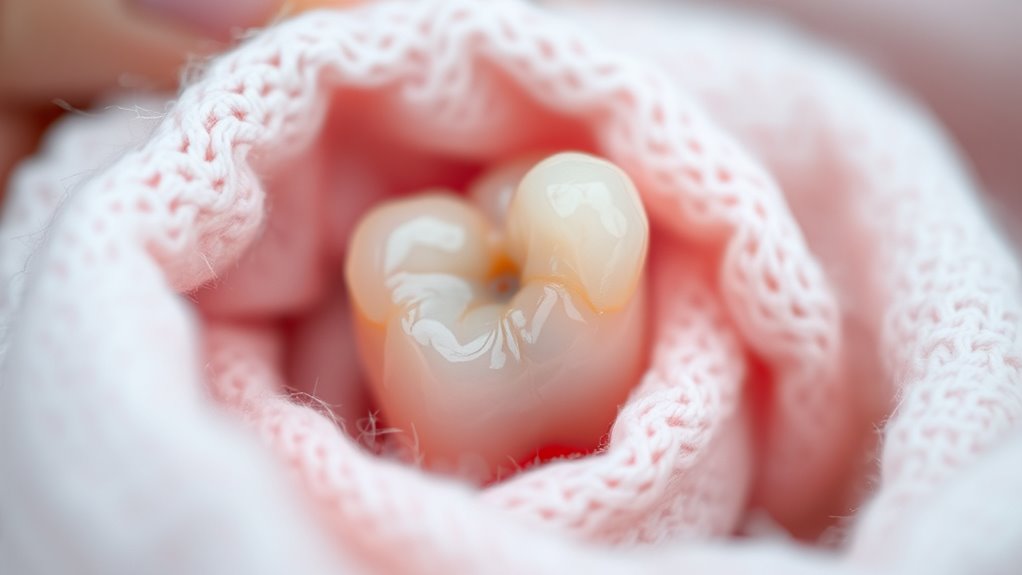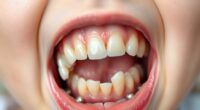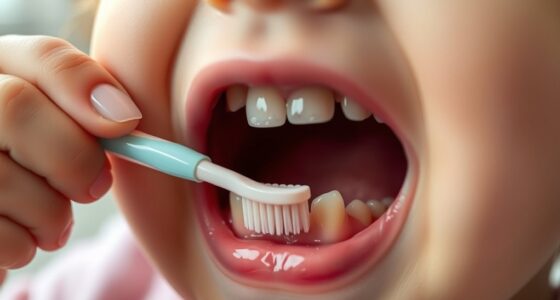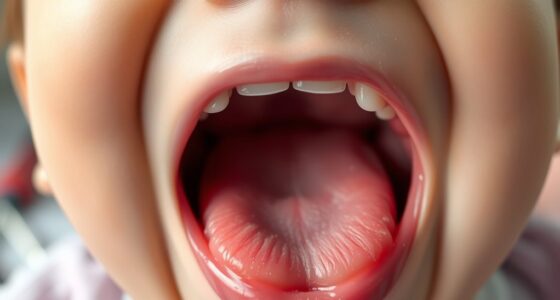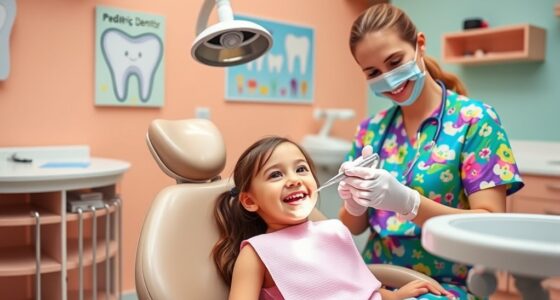Baby teeth are essential for your child’s health and development. They help with proper chewing, support clear speech, and keep space open for adult teeth, preventing future dental issues. They also influence facial appearance and boost confidence. Good oral care, regular dental visits, and managing teething discomfort guarantee healthy teeth as your child grows. Discover how caring for baby teeth now can lay the foundation for a lifetime of healthy smiles and oral well-being.
Key Takeaways
- Baby teeth enable proper chewing and nutrition, supporting overall health and development.
- They guide permanent teeth into correct positions, preventing future orthodontic issues.
- Primary teeth are essential for clear speech development and proper pronunciation.
- They influence facial structure and appearance, boosting confidence and social interaction.
- Healthy baby teeth establish good oral habits, reducing future dental problems.
The Role of Baby Teeth in Children’s Development
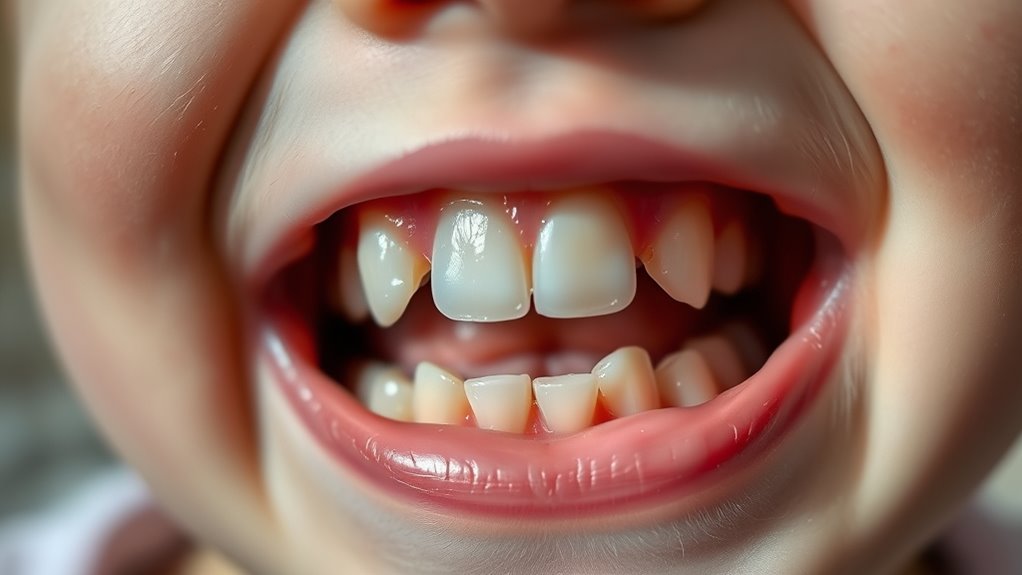
Baby teeth play an essential role in your child’s development by enabling proper chewing, which helps them eat a variety of nutritious foods. These early teeth support your child’s oral health and lay the foundation for healthy permanent teeth later on.
Baby teeth are vital for proper chewing and foundational oral health.
Chewing with baby teeth improves digestion and strengthens jaw muscles, which are essential for overall growth. During early childhood, baby teeth also facilitate clear speech, helping your child pronounce words correctly. Additionally, maintaining healthy baby teeth supports proper tooth development and reduces the risk of future dental problems.
They maintain space in the mouth, ensuring permanent teeth have enough room to emerge properly, preventing misalignment. Proper space maintenance is vital for ensuring that your child’s teeth develop correctly and avoid orthodontic issues later. Proper dental care from an early age also helps prevent cavities and other oral health issues that could affect permanent teeth. Additionally, baby teeth influence facial structure and appearance, boosting your child’s self-esteem and social confidence.
Caring for these teeth from an early age guarantees their health and supports your child’s ongoing development into healthy, confident adults. Proper oral hygiene is crucial in maintaining the health of baby teeth and preventing future dental issues.
When Do Baby Teeth Typically Erupt?
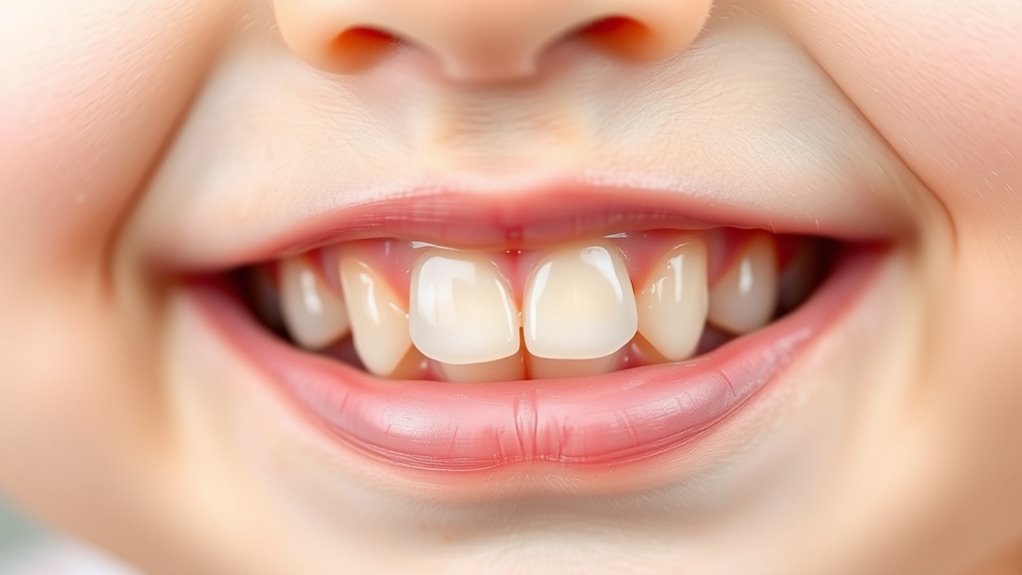
Baby teeth usually start to appear around 6 months old, but some children get their first tooth as early as 3 months. The lower front teeth tend to come in first, followed by the upper front teeth. Keep in mind, the eruption timeline can vary, and some kids may get their teeth earlier or later without any concern. Proper filtration and pump protection help ensure healthy development of your child’s teeth by supporting overall oral health. Staying mindful of sustainable fashion trends can also encourage eco-friendly choices when selecting dental care products for your child. Additionally, understanding the contrast ratio in dental imaging can aid in better detection and monitoring of dental issues as your child’s teeth develop. Recognizing the importance of early dental care can set the foundation for lifelong oral health habits. Being aware of eruption patterns is essential for identifying potential dental issues early on.
Typical Eruption Timeline
Most children start to see their first teeth break through the gums around six months old, though it can happen as early as three months. This marks the beginning of the eruption timeline, which guides teeth development. Additionally, understanding the dentition process can help parents recognize normal developmental patterns and identify potential issues early on. Knowing the typical eruption timeline can also assist in monitoring your child’s dental health progress. Typically, the first teeth to emerge are the lower central incisors. By age 3, most children have a full set of 20 primary teeth in their child’s mouth, including molars, canines, and incisors. The eruption timeline varies slightly, but generally, teeth develop gradually over the first three years. Proper oral care during this period ensures healthy development and maintains your child’s dental health. Consistent dental hygiene practices are essential in supporting healthy tooth development and preventing future dental problems. Full eruption of baby teeth usually occurs by age three, paving the way for permanent teeth development. Understanding this timeline helps you anticipate your child’s dental milestones and guarantees proper oral care during this critical growth phase.
First Teeth Appearance
Wondering when your child’s first teeth will appear? Usually, baby teeth start erupting around 6 months, but some children see their first tooth as early as 3 months. The first to come in are typically the lower central incisors, followed by the upper front teeth. Most kids have their full set of 20 primary teeth by age 3, which is important for overall child development and dental health. Keep in mind, eruption timing varies; some children may experience earlier or later teeth emergence. Tracking this sequence helps ensure proper dental development and allows early intervention if needed. Here’s a quick overview:
| Tooth Type | Typical Eruption Age |
|---|---|
| First tooth (lower) | Around 6 months |
| Upper front teeth | Around 8-12 months |
| Full primary set | By age 3 |
Additionally, maintaining good oral hygiene from the beginning is crucial to prevent dental issues as teeth emerge, emphasizing the importance of dental health during early childhood. Recognizing that curiosity about your child’s dental development can encourage proactive care and monitoring. Being aware of the eruption process can help parents better understand what to expect and when to seek dental consultation.
Eruption Variations
While many children follow a typical pattern of teeth eruption, there’s a natural range of variation in when their baby teeth appear. You might notice your child’s primary teeth emerge earlier or later than average, and that’s normal. The eruption timing can be influenced by genetics, health, and nutrition. Environmental interactions also play a role in the developmental process. Generally, you can expect:
- The lower front teeth to appear first around 6 months, sometimes as early as 3 months.
- The upper front teeth to follow shortly after.
- All 20 primary teeth typically in place by age 3.
- A predictable sequence, starting with central incisors and progressing to molars, which is consistent with the teething development process.
Additionally, dental milestones can vary among children, making each child’s teething journey unique. Recognizing teething timing helps parents monitor healthy teeth development and supports your child’s dental health.
How Cavities Can Affect Baby Teeth and Future Oral Health
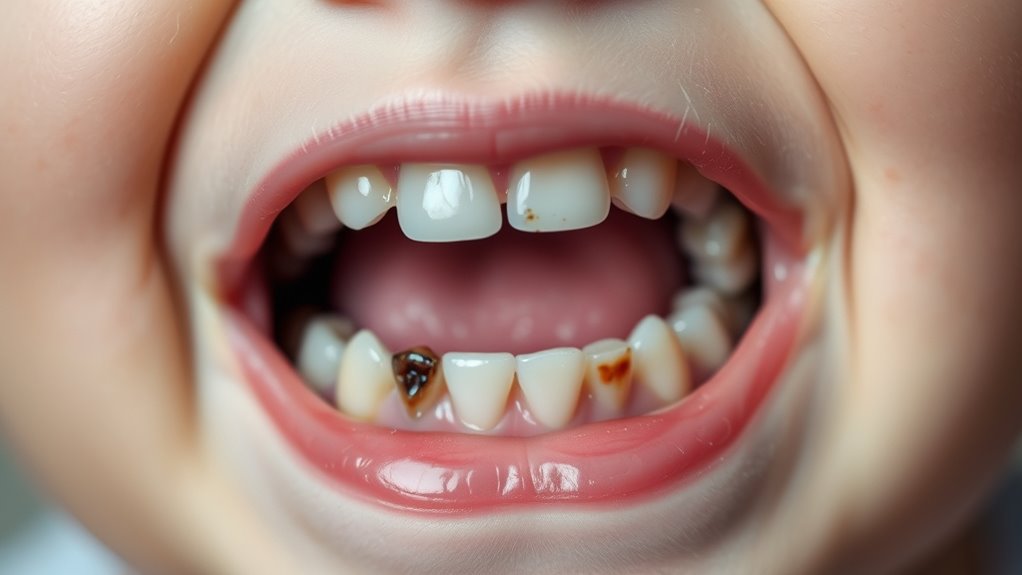
Cavities in baby teeth can lead to pain, infections, and the need for costly procedures like extractions. When primary teeth decay, it can cause discomfort and interfere with eating or speaking, affecting your child’s well-being. If untreated, cavities can spread bacterial damage to surrounding teeth and harm the development of permanent teeth. Missing or damaged primary teeth can disrupt proper spacing, leading to alignment issues later. Additionally, preventive care plays a crucial role in maintaining healthy baby teeth and avoiding these complications. Proper electric toothbrushes can enhance cleaning effectiveness and help prevent cavity formation in young children. Being aware of symptoms of dental decay enables early intervention and promotes better oral health outcomes. Understanding state-specific tax laws can also influence decisions about dental care costs and planning. Regular dental checkups and early treatment are vital for preventing long-term oral health problems in children.
Daily Practices to Maintain Healthy Baby Teeth
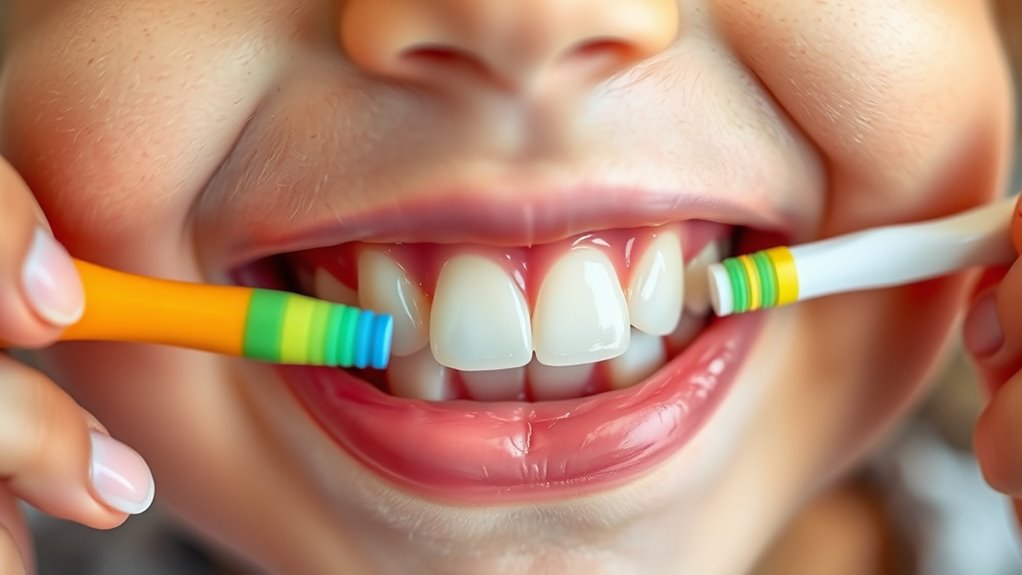
Establishing a consistent oral hygiene routine is key to keeping your baby’s teeth healthy. Proper dental care starts early and sets the foundation for lifelong oral health. Here are essential daily practices:
- Brush your baby’s emerging teeth twice a day with a small, soft-bristled toothbrush and a rice-sized amount of fluoride toothpaste to remove plaque and prevent cavities.
- Wipe your baby’s gums with a damp cloth or gauze after feedings to reduce bacteria buildup and foster early oral hygiene habits.
- Use dental floss once two teeth touch to remove food debris and plaque from hard-to-reach areas as their teeth grow closer.
- Encourage drinking plenty of plain, fluoridated water to strengthen enamel and support saliva flow, aiding in cavity prevention and healthy teeth.
- Regularly exfoliating your baby’s gums and emerging teeth with gentle methods can help prevent buildup of plaque and bacteria, promoting healthier oral development. Incorporating natural remedies such as gentle essential oils with antimicrobial properties can also support oral hygiene when used appropriately. Additionally, utilizing advanced oral care technologies can enhance the effectiveness of daily cleaning routines. Implementing routine dental checkups from an early age can further contribute to preventing dental issues and ensuring proper development.
The Significance of Fluoride and Professional Dental Care

Fluoride plays an essential role in protecting your child’s developing teeth by strengthening enamel and making it more resistant to decay. It helps prevent tooth decay in baby teeth, which is indispensable for maintaining good oral health. Many communities have fluoridated water supplies that naturally provide fluoride, supporting your child’s dental care. Regular professional dental visits include applying fluoride varnish 2-4 times a year, considerably reducing cavity risk. Dentists and pediatricians also recommend using a small amount of fluoride toothpaste, about the size of a grain of rice, as soon as teeth erupt. Additionally, community water fluoridation is considered one of the most effective public health measures to prevent dental caries. These professional dental care measures, along with proper fluoride use, are fundamental for safeguarding your child’s baby teeth and establishing a foundation for lifelong oral health.
Recognizing and Relieving Teething Discomfort
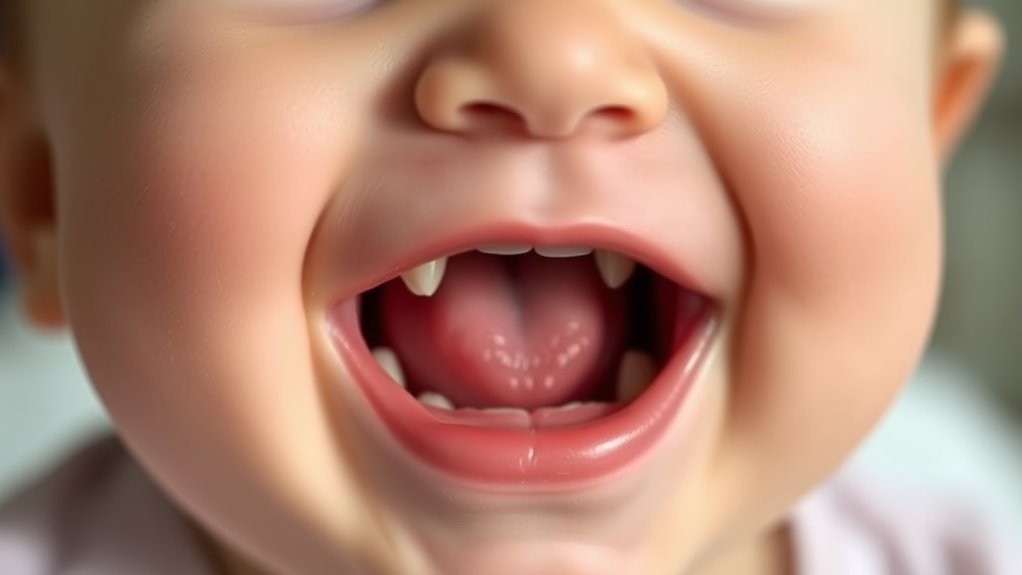
You’ll want to watch for signs like drooling, biting, or fussiness, which indicate your baby is teething.
Gently massaging their gums or offering safe teething toys can help ease their discomfort.
If you notice fever, rash, or diarrhea alongside teething symptoms, it’s important to consult a healthcare professional.
Soothing Teething Techniques
Teething can be uncomfortable for your baby, but gentle techniques can provide quick relief. To soothe their gums, try these methods:
- Gently massage your baby’s gums with a clean finger or moist gauze pad to ease discomfort and reduce gum inflammation.
- Refrigerate a solid rubber teether for a short time; the coolness helps lessen teething pain and inflammation.
- Rubbing the gums with a chilled spoon can numb pain and offer comfort during teething episodes.
- Avoid liquid-filled or plastic teethers, as they may break and cause injury, instead choosing safe options recommended by pediatric dentistry.
These soothing teething techniques can help your baby find relief naturally while supporting healthy baby teeth development. If symptoms worsen, consult a pediatrician.
Signs of Severe Discomfort
While teething is usually manageable, certain signs indicate your baby may be experiencing severe discomfort that requires attention. Look for high fever, diarrhea, or rash, as these aren’t typical and need medical consultation. Persistent crying, excessive drooling, and trouble sleeping also signal significant pain or inflammation. Swollen, tender gums that are redder than usual suggest severe teething discomfort or infection. To help relieve pain, try cold teething rings, gentle gum massages, or over-the-counter pain relief. If your baby shows signs like refusal to eat or extreme irritability, it’s essential to seek professional advice promptly.
| Symptom | Action Needed |
|---|---|
| Swollen, red gums | Pain relief, medical consultation |
| Excessive drooling | Comfort measures, monitor symptoms |
| High fever or rash | Immediate medical consultation |
Why Early Dental Visits Are Essential for Young Children
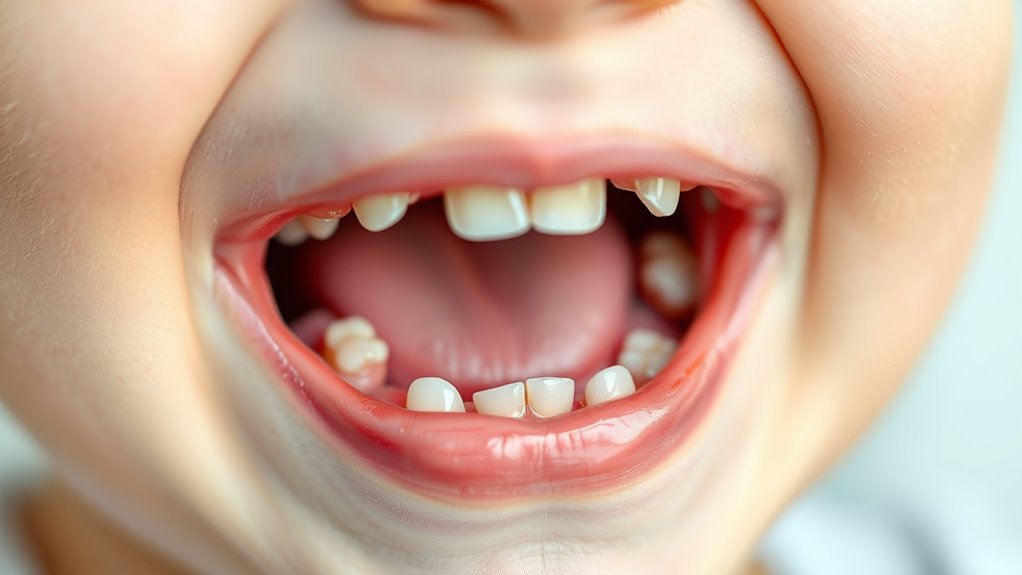
Starting dental visits early is essential because it sets the foundation for a lifetime of good oral health. The American Academy of Pediatric Dentistry recommends your child have their first dental visit by age one or when their first tooth erupts.
During this visit, a pediatric dentist can:
- Perform preventive dental care like professional cleaning and fluoride treatments.
- Identify potential issues such as cavities or misalignment early.
- Help your child become comfortable with dental routines, reducing fear.
- Educate you on establishing healthy oral habits that last a lifetime.
Early dental care ensures your child’s teeth develop properly and promotes a positive attitude toward dental visits. Regular checkups support preventive care, making future dental visits less stressful and more effective.
The Impact of Baby Teeth on Speech and Facial Appearance
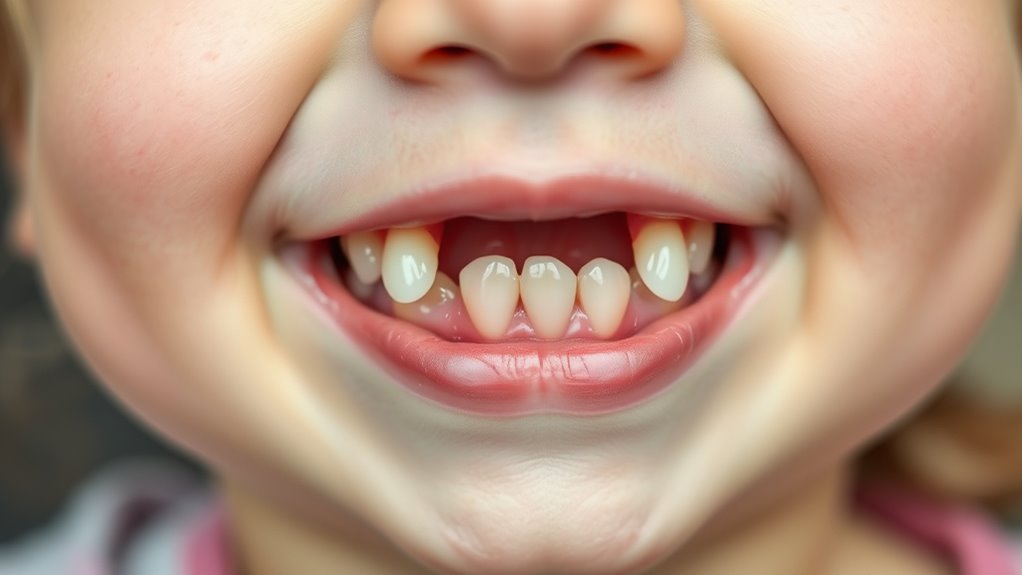
Early dental visits help guarantee your child’s primary teeth develop properly, which directly influences their speech clarity and facial appearance. Baby teeth guide tongue placement and support correct pronunciation, making speech development smoother.
The size and position of primary teeth also shape your child’s face, impacting facial symmetry and overall appearance. When baby teeth are well-aligned, they help maintain proper facial proportions, preventing sunken cheeks or exaggerated features.
Conversely, early loss or misalignment can cause speech delays or difficulty articulating specific sounds. Maintaining healthy baby teeth supports natural facial development, ensuring your child can smile confidently and interact socially without barriers.
Prioritizing oral health now sets the foundation for both effective speech and a balanced facial appearance later in life.
Preventing Future Dental Problems Through Proper Care

Proper care of your child’s teeth now can prevent many future dental problems. Maintaining good oral hygiene and scheduling regular dental visits for their baby teeth are essential for early prevention. Proper dental care helps reduce cavities and decay, which can lead to more serious issues later.
To set a strong foundation, consider these steps:
- Use fluoride toothpaste and professional fluoride treatments to strengthen enamel.
- Limit sugary foods and drinks to prevent bacterial growth and enamel erosion.
- Ensure consistent brushing and flossing routines to maintain oral hygiene.
- Monitor spacing to prevent misalignment and crowded teeth as they grow.
Frequently Asked Questions
Are Baby Teeth Really Important?
You might wonder if baby teeth matter, but they’re actually very important. They help you chew properly, speak clearly, and keep space for your permanent teeth to grow in correctly.
Taking care of your baby teeth now prevents pain, infections, and future dental problems. Good habits early on set the stage for healthy teeth later in life, so don’t overlook their role in your overall dental health.
Why Do Humans Need Baby Teeth?
You need baby teeth because they help you chew and speak properly as you grow. They also keep space open for your permanent teeth, preventing misalignment.
Baby teeth support your facial structure and help develop your jawbones. Plus, they allow you to eat different foods, which is important for your health.
Taking care of them now sets the stage for healthy, strong adult teeth later on.
What Happens if You Don’t Take Care of Baby Teeth?
If you ignore baby teeth, it’s like letting weeds overrun a garden—decay spreads, causing pain and infections that can require costly fixes.
Cavities weaken the foundation, making way for crooked, misaligned teeth later.
Poor care lets bacteria roam freely, risking overall health.
You might struggle with speech, chewing, or confidence.
Infections can even travel elsewhere, turning a small problem into a serious health threat—so, don’t let neglect take root.
Is There a Benefit to Keeping Baby Teeth?
You might wonder if keeping baby teeth is beneficial. The answer is yes—retaining them helps maintain proper spacing for adult teeth, preventing misalignment. Healthy baby teeth also support correct speech and encourage confident smiling.
Plus, they assist with chewing, which impacts nutrition and overall health. Keeping your child’s baby teeth reduces the risk of infections and complications that could harm their permanent teeth later on, making their dental health smoother in the long run.
Conclusion
So, enjoy those tiny teeth while they last—after all, they’re just placeholders for the real grin. Neglect them now, and you might end up with a mouth full of surprises later. Remember, good dental habits aren’t just for aesthetics; they’re the foundation of future confidence and health. Who knew that tiny teeth could hold such big responsibilities? So brush, floss, and visit the dentist—your future self will thank you (or at least, have fewer reasons to complain).
